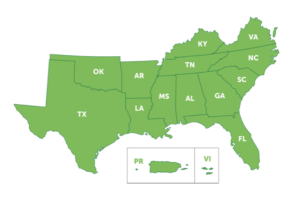Introducing SAgE and Director Tesha Humphrey
The Southern Ag Exchange Network – or SAgE – is the southern region of the USDA’s Farm and Ranch Assistance Network (FRSAN), whose goal is to provide “stress assistance programs to individuals who are engaged in farming, ranching, and other agriculture-related occupations on a regional basis.” The southern region includes 13 states and two territories, and the grant was awarded to Dr. Heather Sedges at the University of Tennessee Extension/Institute of Agriculture.
region of the USDA’s Farm and Ranch Assistance Network (FRSAN), whose goal is to provide “stress assistance programs to individuals who are engaged in farming, ranching, and other agriculture-related occupations on a regional basis.” The southern region includes 13 states and two territories, and the grant was awarded to Dr. Heather Sedges at the University of Tennessee Extension/Institute of Agriculture.

Providing a central backbone to the operation of SAgE is Director Tesha Humphrey, who has worked closely with Dr. Sedges and the UTIA team. An employee of the University of Tennessee since 2011, Tesha started working as an Extension Assistant on the FRSAN/SAgE grant in 2021, and after several months she moved into the role of Program Coordinator. In September of this year, the team decided that Director more accurately described her role.
With a background in social work, having worked in mental health case management for 15 years and in hospice care, Tesha views the work of SAgE through a mental health lens. Her East Tennessee roots provide a connection to agriculture, as well: “I am the granddaughter of a sharecropper. My grandmother and grandfather lived on a farm near Lick Skillet, if that tells you anything about how rural it was,” she says, and there are a lot of farmers in her extended family.
Dr. Sedges has assembled a team of professionals to carry out the work of providing a farmer support hotline; creating training programs, workshops, and support groups; engaging in meaningful applied research; gathering a comprehensive list of resources across the region; partnering with like-minded entities and organizations; and disseminating information and materials.
The Southern Region
Describing how UT Extension came to lead the USDA’s FRSAN grant for the southern region, SAgE director Tesha Humphrey says: “When Dr. Sedges was encouraged to write the grant, she reached out across the region and established key partnerships with other universities and agriculture-focused entities and leaders aligned with rural communities, agriculture complexes, and stress.”
Addressing Stress and Providing Resources
From the beginning, Humphrey says, a primary focus of SAgE has been to frame the work around the concept of stress to help avoid some of the stigma the phrase “mental health” can conjure. Stressors such as finances, weather, and market forces are concrete things that can be talked about with farmers to create a trusting conversation. ”Mental health can be a trickier subject to engage directly, so we come at it from practical issues,“ she says.
There are resources across the region in place to help farmers cope with stressors, but finding those resources can be very challenging, so making them accessible through a searchable directory is a main focus of SAgE. Without a central repository of resources, a farmer in southern Kentucky may be unaware of help that’s available just over the state line in Tennessee. A free online resource in Florida might never be found by an extension case worker in Alabama. The SAgE resource database builds both awareness and connectivity.
“We’re working to identify those audiences that have been underserved,” Humphrey says. “Part of our ethos is to increase the accessibility of resources to all farmers in need, with an emphasis on those who have historically had lesser access. As we identify gaps across the network, we will address access issues, capacity challenges and work directly with providers to increase equitable use by farmers in need.”
